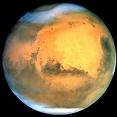 Close Topic Options
Close Topic OptionsMars - Page 8 of 9
Scientists have modeled Mars climate to understand - Page 8 - Sciences, Education, Art, Writing, UFO - Posted: 14th May, 2020 - 10:32pm
Mars - Page 8
I am not sure if we clear off some of the cloud cover on venus it could start to cool down. Venus has water in the atmosphere just need to break the cloud cover to allow it breath some of that heat off and it could be closer to earth like in the near future. I think both planets are a option at this time.
Mars
Rover findings indicate stratified lake on ancient Mars. A long-lasting lake on ancient Mars provided stable environmental conditions that differed significantly from one part of the lake to another, according to a comprehensive look at findings from the first three-and-a-half years of NASA's Curiosity rover mission. Source 4c.
Page 8 Mars
MAVEN's top 10 discoveries at Mars. Since its launch in November 2013 and its orbit insertion in September 2014, MAVEN has been exploring the upper atmosphere of Mars. MAVEN is bringing insight to how the sun stripped Mars of most of its atmosphere, turning a planet once possibly habitable to microbial life into a barren desert world. Source 4s.
Mars
Ancient, massive asteroid impact could explain Martian geological mysteries. A colossal impact with a large asteroid early in Mars' history may have ripped off a chunk of the northern hemisphere and left behind a legacy of metallic elements in the planet's interior. The crash also created a ring of rocky debris around Mars that may have later clumped together to form its moons, Phobos and Deimos. Source 4w.
Mars
This does not surprise me at all as in the early days of planet formation a lot of large objects struck each other that is what happened with the earth and the result of the collision of two large objects gave us our moon. All the planets in the solar system have scars on them from collisions with other objects.
Mars - Page 8
Martian landscapes formed from sand 'levitating' on a little boiling water. Scientists have discovered a process that could explain the long-debated mystery of how land features on Mars are formed in the absence of significant amounts of water. Experiments reveal that Mars' thin atmosphere (About 7 mbar -- compared to 1,000 mbar on Earth) combined with periods of relatively warm surface temperatures causes water flowing on the surface to violently boil. This process can then move large amounts of sand and other sediment, which effectively 'levitates' on the boiling water. Source 1a.
Mars Sciences Education Art Writing & UFO - Page 8
Scientists have modeled Mars climate to understand habitability. Scientists have modeled the atmosphere of Mars to help determine that salty pockets of water present on the Red Planet are likely not habitable by life as we know it on Earth. The team helped allay planetary protection concerns about contaminating potential Martian ecosystems. Source 8x.
 TOPIC: Mars
TOPIC: Mars Getting to Mars - Terra Forming - Getting to Mars from Earth
Getting to Mars - Terra Forming - Getting to Mars from Earth